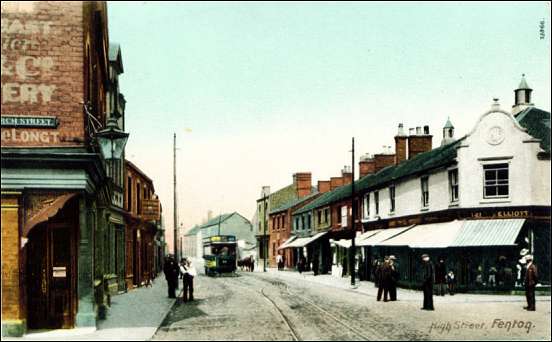Historian Fred Hughes writes....
Philip Elliott was born in Newcastle where he trained to be a draper at
his father’s shop. Later in life he moved to Longton and ran two clothes
shops in Fenton.
“Elliott was the typical commercial Liberal, a new breed of local
representative that emerged as a strong factor on new urban councils
after a number of reform acts offered an enlarged electorate a wider
choice of candidates,” says Potteries historian Steve Birks.
“Naturally everyone knew the shopkeepers in their town. They were the
pillars of society, admired self-made men who were always on hand for
advice, always helpful to a community who were their customers as well
as their constituents. Local politics before was governed by the
unreachable upper classes that were predominantly landowning
Conservatives holding power in the County Councils. The vast majority of
people were never occupied by elections. But as the industrial towns
settled to civic regulation so the electorate became more in tune with
the men who looked after their interests on the doorstep.”
|
The first group to take advantage of this were the commercial
agents; businessmen and shopkeepers, and later other community
personalities such as solicitors, clergymen and even publicans. As
the new Stoke-on-Trent council grew it soon became known as the
‘tradesmen’s council’, even to holding the main council meeting on
Thursday afternoons to correspond with their half-day closing. It
was these men who initiated an element of radicalism and a measure
of apolitical dissent in the council.

High Street
East Fenton, looking towards High Street West and Stoke.
This road is now known as City Road.
Elliott's outfitter and drapers shop can be seen on the right of the
picture
“Philip Elliott was one of the first of these tradesmen
councillors,” agrees local councillor and lifelong resident of
Fenton, Paul Shotton. “He really did operate the House of Elliott, a
popular gent’s outfitter and draper in a prominent position in City
Road. I remember it being a family business well into the mid 1970’s
before it became Royal Oak Furniture.”
By 1910 the population of the Potteries had increased dramatically. In
1750 Burslem was the most important town with a population was 1,500 –
Hanley had less than 1,000. The other four towns could only muster a
total of 1,200 together. But the critical 1911 census told a
completely different story. Hanley then had a population of 66,264;
Burslem was now second with 41,573. But in acreage Fenton was the
biggest.
|
“Elliott and his contemporary John Shaw Goddard were seen as domestic
revolutionaries,” Steve continues.
“Goddard was part of the new wave of pottery manufacturers. Both men
were elected to Fenton Urban District Council in the 1890’s. Both men
held high positions, and both became chairman of Fenton council. But
while Elliott was fiercely opposed to federation, Goddard held a more
moderate view. They were brilliant political protagonists successfully
contesting the Duke of Sutherland’s court action accusing Fenton council
of polluting the River Trent as it passed through Trentham. They
powerfully argued Fenton’s case too when it came to settling the burning
question of unequal parity of post-federation collective rates
contributions. And Elliott controversially opposed Cecil Wedgwood in his
bid to become the first mayor.”
Yet despite their dissent, or perhaps because of it, both men were chosen
to be the third and fourth mayor of the new Stoke-on-Trent council –
Elliott 1913-1915 and Goddard 1915-1917.
“They were strong characters,” declares Paul. “And they promoted Fenton
at a time when it could easily have become the forgotten town that
Arnold Bennett had controversially omitted. Although Fenton has proven
historical antecedents it came to be seen as a place between county
boroughs – a place that lay between towns on the way to somewhere else.
But men like Elliott and Goddard would have none of this. Sadly nowadays
Fenton has had its heart torn from it. There is no centre which is
something I’d like to see addressed with improving regeneration
policies.”
Fenton and Tunstall were both urban district council and consequently had
no mayor prior to federation.
“All the ceremony the other towns had was denied to Fenton and Tunstall,”
continues Paul. “There were no robes or chains of office, trappings that
were incorporated into the new Stoke-on-Trent. Yet I have heard recently
that the administrative jewel of Fenton’s civic authority, a badge
denoting its heritage, has been discovered in a private collection. If it
can be recovered I’d love to see it placed in the current Lord Mayor’s
chain of office if only to recognise the achievements of men like Elliott
and Goddard and the importance Fenton played in the making of the City of
Stoke-on-Trent.”
Apart from Elliott and Goddard only four others have held the high
office of Mayor and Lord Mayor of Stoke-on-Trent for consecutive terms,
Cecil Wedgwood, Fred Geen and William Robinson. The last was John Henry
Dale 1935-1937, although in more recent times John Birkin, Douglas Brown
and William Austin have been twice elected but on separate occasions.
“Elliott felt blessed to represent Fenton referring to it as an ‘earthly
paradise’,” concludes Steve. “It was a eulogy that was regularly thrown
back into his face by opponents who derided a Newcastle man professing
such love for Fenton yet choosing to make his home in Longton.”

click the "contents"
button to get back to the main index
